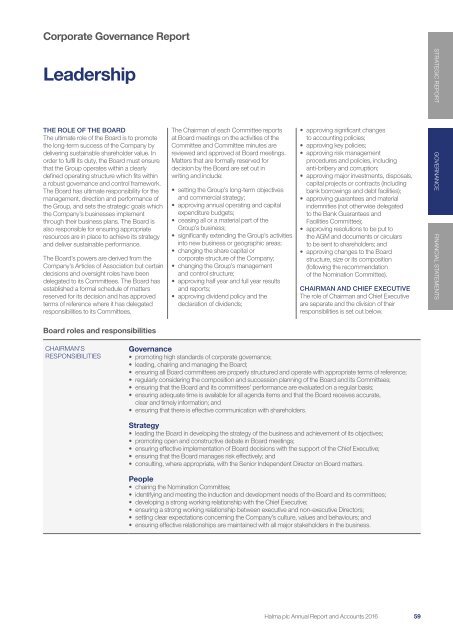Create successful ePaper yourself
Turn your PDF publications into a flip-book with our unique Google optimized e-Paper software.
Corporate Governance Report<br />
Leadership<br />
THE ROLE OF THE BOARD<br />
The ultimate role of the Board is to promote<br />
the long-term success of the Company by<br />
delivering sustainable shareholder value. In<br />
order to fulfil its duty, the Board must ensure<br />
that the Group operates within a clearly<br />
defined operating structure which fits within<br />
a robust governance and control framework.<br />
The Board has ultimate responsibility for the<br />
management, direction and performance of<br />
the Group, and sets the strategic goals which<br />
the Company’s businesses implement<br />
through their business plans. The Board is<br />
also responsible for ensuring appropriate<br />
resources are in place to achieve its strategy<br />
and deliver sustainable performance.<br />
The Board’s powers are derived from the<br />
Company’s Articles of Association but certain<br />
decisions and oversight roles have been<br />
delegated to its Committees. The Board has<br />
established a formal schedule of matters<br />
reserved for its decision and has approved<br />
terms of reference where it has delegated<br />
responsibilities to its Committees.<br />
The Chairman of each Committee reports<br />
at Board meetings on the activities of the<br />
Committee and Committee minutes are<br />
reviewed and approved at Board meetings.<br />
Matters that are formally reserved for<br />
decision by the Board are set out in<br />
writing and include:<br />
• setting the Group’s long-term objectives<br />
and commercial strategy;<br />
• approving annual operating and capital<br />
expenditure budgets;<br />
• ceasing all or a material part of the<br />
Group’s business;<br />
• significantly extending the Group’s activities<br />
into new business or geographic areas;<br />
• changing the share capital or<br />
corporate structure of the Company;<br />
• changing the Group’s management<br />
and control structure;<br />
• approving half year and full year results<br />
and reports;<br />
• approving dividend policy and the<br />
declaration of dividends;<br />
• approving significant changes<br />
to accounting policies;<br />
• approving key policies;<br />
• approving risk management<br />
procedures and policies, including<br />
anti-bribery and corruption;<br />
• approving major investments, disposals,<br />
capital projects or contracts (including<br />
bank borrowings and debt facilities);<br />
• approving guarantees and material<br />
indemnities (not otherwise delegated<br />
to the Bank Guarantees and<br />
Facilities Committee);<br />
• approving resolutions to be put to<br />
the AGM and documents or circulars<br />
to be sent to shareholders; and<br />
• approving changes to the Board<br />
structure, size or its composition<br />
(following the recommendation<br />
of the Nomination Committee).<br />
CHAIRMAN AND CHIEF EXECUTIVE<br />
The role of Chairman and Chief Executive<br />
are separate and the division of their<br />
responsibilities is set out below.<br />
STRATEGIC REPORT GOVERNANCE FINANCIAL STATEMENTS<br />
Board roles and responsibilities<br />
CHAIRMAN’S<br />
RESPONSIBILITIES<br />
Governance<br />
• promoting high standards of corporate governance;<br />
• leading, chairing and managing the Board;<br />
• ensuring all Board committees are properly structured and operate with appropriate terms of reference;<br />
• regularly considering the composition and succession planning of the Board and its Committees;<br />
• ensuring that the Board and its committees’ performance are evaluated on a regular basis;<br />
• ensuring adequate time is available for all agenda items and that the Board receives accurate,<br />
clear and timely information; and<br />
• ensuring that there is effective communication with shareholders.<br />
Strategy<br />
• leading the Board in developing the strategy of the business and achievement of its objectives;<br />
• promoting open and constructive debate in Board meetings;<br />
• ensuring effective implementation of Board decisions with the support of the Chief Executive;<br />
• ensuring that the Board manages risk effectively; and<br />
• consulting, where appropriate, with the Senior Independent Director on Board matters.<br />
People<br />
• chairing the Nomination Committee;<br />
• identifying and meeting the induction and development needs of the Board and its committees;<br />
• developing a strong working relationship with the Chief Executive;<br />
• ensuring a strong working relationship between executive and non-executive Directors;<br />
• setting clear expectations concerning the Company’s culture, values and behaviours; and<br />
• ensuring effective relationships are maintained with all major stakeholders in the business.<br />
<strong>Halma</strong> plc Annual Report and Accounts <strong>2016</strong> 59

















